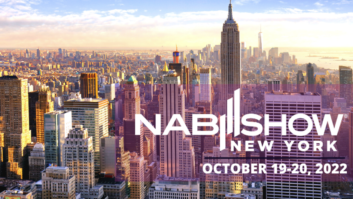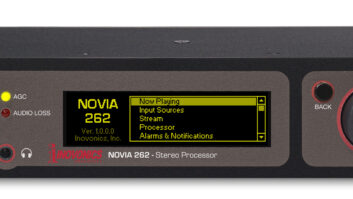Radio World is checking in with business and technology leaders about the state of the industry as radio prepares for the NAB Show in April.
Natalie Marsh is VP, market manager of Lotus Broadcasting in Las Vegas. She is in her 25th year with the company.
Radio World: What do you consider to be the most important issue or challenge for radio broadcast owners and executives right now?

Natalie Marsh: Radio has many of the same challenges many businesses face in a post-COVID world.
We are all trying to navigate the impact of inflation. In my opinion this requires investing in updated technology, which can improve efficiency across the operation while optimizing ways to engage with your audience.
One example of this would be updating studio equipment to include cameras in the studio. Listeners and advertisers alike are looking for a 360-degree interaction. The appeal of radio has always been the connection to the local audience. You can increase that connection by adding a video option. It allows you to compete with content creators.
Audio remains the king, but it is necessary in today’s environment to meet your listeners where they are at. It also requires creative compensation packages to help employees who are also battling the impact of rising costs. This can be as simple as flexible schedules and remote work when possible. These options help save commuting costs or allow for a work life balance that normally could create cost of living challenges.
RW: What technologies or new media platforms are you watching closely, for their potential impact on how radio organizations do business?
Marsh: The biggest one I am watching currently is podcasting. It has been rapidly growing and it is such a complimentary platform for radio.
We have some pretty popular podcasts for our sports stations that are simply on-demand options for listeners of the show. These are the simplest examples of how to turn current content into a new option for listeners.
From there you need to look at other options to explore. What passions do people have in the building that could engage an audience? You never know what gold mine exists in your team. We all have such diverse backgrounds, hobbies and likes.
It all circles back to connections. Finding topics that help you connect with the audience.
The other platform I am paying attention to is social audio. In sports radio, the social media platform of choice is X. I am highly intrigued by X Spaces with this audience. Sports hosts and listeners alike are very passionate about sharing their opinions in the sports space.
Other social audio apps have come into the market that I am watching for how they may align with some of our other formats. Clubhouse, Discord and Stereo are a few that I am paying attention to.
RW: Generative artificial intelligence was last year’s big buzz topic. Has it met expectations for its impact in radio?
Marsh: AI is not going away. Quite the opposite. It is growing at an almost frightening pace. My viewpoint on things like AI is leaning into how they can help you.
Again, I am going to focus on what I consider to be one of radio’s biggest attributes: connection to the local audience. So we are looking at how AI can help us streamline content creation.
Can we use it to help us with more interactive features such as polls, quizzes or live chats? I am also looking at the abilities of AI to analyze listener behaviors and how we can utilize this to enhance their radio listening experience. We also want to figure out if there is an ethical way to use it to enhance engagement for our listeners without losing the human connection that is paramount to radio.
We are being very cautious in the AI world. You have already seen the backlash on some industries that might have jumped in too quickly.
RW: Over the next three years, what will be the most important change or evolution in how radio companies are run?
Marsh: It feels like, now more than ever, it is hard to predict how technology may evolve.
I am aging myself here a little, but I sometimes think back to my childhood watching “The Jetsons” on Saturday mornings and I think “Wow, we are so close to that reality.” I never imagined that we would be able to see the people we were talking to via phone on a video screen, but it is so commonplace now.
Radio has been ever evolving and I do not expect that to change. Radio will expand its online presence and digital platforms. It will figure out how to use emerging technology to tailor content and enhance audience engagement.
So as an executive at a radio company, you have an obligation to stay on top of the trends and technology. It is so important to continue to understand and explore ways to engage your audience.
RW: Other thoughts? And what else should radio managers be thinking about as the spring show approaches?
Marsh: This year marks 25 years with Lotus for me. It is such an honor to work for the Kalmensons. They truly care about community and our partners, and they encourage that for all of their employees.
I have never failed to find the solutions to my challenges or some new emerging technology at the NAB Show. You have to keep an open mind in order to really grow and adapt. Growing up one of my favorite movies was “Ferris Bueller’s Day Off.” It was such a generationally iconic movie. It also has one of my favorite quotes: “Life moves pretty fast. If you don’t stop and look around once in a while, you could miss it.” He may be saying that to convince his friend to ditch school, but I like to use it as a reminder to not move so fast you miss the important things.












